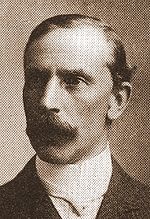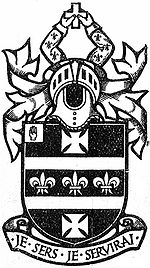
Gilbert Barling
Encyclopedia

Order of the Bath
The Most Honourable Order of the Bath is a British order of chivalry founded by George I on 18 May 1725. The name derives from the elaborate mediæval ceremony for creating a knight, which involved bathing as one of its elements. The knights so created were known as Knights of the Bath...
CBE
Order of the British Empire
The Most Excellent Order of the British Empire is an order of chivalry established on 4 June 1917 by George V of the United Kingdom. The Order comprises five classes in civil and military divisions...
FRCS (30 April 1855 – 27 April 1940) was an English
England
England is a country that is part of the United Kingdom. It shares land borders with Scotland to the north and Wales to the west; the Irish Sea is to the north west, the Celtic Sea to the south west, with the North Sea to the east and the English Channel to the south separating it from continental...
physician.
Barling was born at Newnham on Severn
Newnham on Severn
Newnham on Severn is a village in west Gloucestershire, England. It lies near the Royal Forest of Dean, on the west bank of the River Severn, approximately 10 miles south-west of Gloucester and three miles southeast of Cinderford, at . It is on the A48 road between Gloucester and Chepstow,...
, Gloucestershire
Gloucestershire
Gloucestershire is a county in South West England. The county comprises part of the Cotswold Hills, part of the flat fertile valley of the River Severn, and the entire Forest of Dean....
and educated at a boarding school at
Weston, near Bath. He went to Birmingham
Birmingham
Birmingham is a city and metropolitan borough in the West Midlands of England. It is the most populous British city outside the capital London, with a population of 1,036,900 , and lies at the heart of the West Midlands conurbation, the second most populous urban area in the United Kingdom with a...
at the age of 20, to take his matriculation exam at
Queen’s College
Queen's College, Birmingham
The Birmingham Medical School was founded by surgeon William Sands Cox in 1828 as a residential college for medical students in central Birmingham, England. It was the first Birmingham institution to award degrees, through the University of London. Cox went on to found the Queen's Hospital in Bath...
, before going on to study at St Bartholomew's Hospital
St Bartholomew's Hospital
St Bartholomew's Hospital, also known as Barts, is a hospital in Smithfield in the City of London, England.-Early history:It was founded in 1123 by Raherus or Rahere , a favourite courtier of King Henry I...
in London and culminating in his admittance to the Royal College of Surgeons
Royal College of Surgeons of England
The Royal College of Surgeons of England is an independent professional body and registered charity committed to promoting and advancing the highest standards of surgical care for patients, regulating surgery, including dentistry, in England and Wales...
in 1879, becoming a Fellow in 1881. It was at this time he was appointed resident pathologist at the General Hospital which would start an association lasting for 60 years. He became President of the hospital in 1925.
From 1913 to 1933 he held the office of Vice Chancellor (renamed Pro-Chancellor in 1927) of the University of Birmingham
University of Birmingham
The University of Birmingham is a British Redbrick university located in the city of Birmingham, England. It received its royal charter in 1900 as a successor to Birmingham Medical School and Mason Science College . Birmingham was the first Redbrick university to gain a charter and thus...
, during which time and under his guidance the research departments in mental diseases and cancer were founded. He was Vice President and Chairman of the Council of The Birmingham Civic Society
The Birmingham Civic Society
The Birmingham Civic Society was founded at an inaugural meeting on 10 June 1918 in The Council House, Birmingham, England and is registered with The Civic Trust. The first President of the Society, the Earl of Plymouth, addressed the assembled Aldermen, Councillors, Architects and other city...
for 22 years from its creation in 1918 until his death in 1940. He was also for many years the Chairman of the Birmingham Hospital Saturday Fund
Birmingham Hospital Saturday Fund
The Birmingham Hospital Saturday Fund, now called BHSF, was founded in 1873 to raise money for hospitals in Birmingham, England.-Sunday Fund:...
. His association with the university had begun in 1885 when he was appointed Demonstrator of Anatomy at Queen’s College and he was for many years on the teaching staff of the Medical School, becoming Professor of Pathology in 1885. In 1893 he was appointed co-professor of Surgery at Mason's College
Mason Science College
Mason Science College was founded by Josiah Mason in 1875, the buildings of which were opened in Edmund Street, Birmingham, England on 1 October 1880 by Thomas Henry Huxley...
(the forerunner of the University) and Dean of the Faculty of Medicine.

Royal Army Medical Corps
The Royal Army Medical Corps is a specialist corps in the British Army which provides medical services to all British Army personnel and their families in war and in peace...
, acting as consulting surgeon in the Southern Command, subsequently being posted at the rank of Colonel
Colonel (UK)
Colonel is a rank of the British forces, ranking below Brigadier, and above Lieutenant Colonel. British Colonels are not usually field commanders; typically they serve as staff officers between field commands at battalion and brigade level. The insignia is two diamond shaped pips below a crown...
to the Western Front
Western Front (World War I)
Following the outbreak of World War I in 1914, the German Army opened the Western Front by first invading Luxembourg and Belgium, then gaining military control of important industrial regions in France. The tide of the advance was dramatically turned with the Battle of the Marne...
from October 1916 to August 1917. His service to King and Countrymen earned him the Companion of the Bath (military) in 1917 and in 1919 he was made a Commander of the Order of the British Empire. In August 1919 King George V
George V of the United Kingdom
George V was King of the United Kingdom and the British Dominions, and Emperor of India, from 6 May 1910 through the First World War until his death in 1936....
conferred upon him a Baronetcy
Baronet
A baronet or the rare female equivalent, a baronetess , is the holder of a hereditary baronetcy awarded by the British Crown...
and the College of Arms
College of Arms
The College of Arms, or Heralds’ College, is an office regulating heraldry and granting new armorial bearings for England, Wales and Northern Ireland...
granted his Coat of Arms
Coat of arms
A coat of arms is a unique heraldic design on a shield or escutcheon or on a surcoat or tabard used to cover and protect armour and to identify the wearer. Thus the term is often stated as "coat-armour", because it was anciently displayed on the front of a coat of cloth...
some three months later.
In 1923 he had been involved in the setting up of the Birmingham Branch of the British Empire Cancer Campaign (now Cancer Research UK
Cancer Research UK
Cancer Research UK is a cancer research and awareness charity in the United Kingdom, formed on 4 February 2002 by the merger of The Cancer Research Campaign and the Imperial Cancer Research Fund. Its aim is to reduce the number of deaths from cancer. As the world's largest independent cancer...
) and became its first Chairman. He was a hard worker and talented administrator and in 1936, in recognition of his hospital, university and other public service, he was presented with The Birmingham Civic Society’s Gold Medal (a rare accolade given to those who have made a high contribution to life in Birmingham).
Sir Gilbert chaired his last meeting of the Civic Society’s Executive Council on 19 March 1940 and he died from heart failure at his home (whilst in his garden) at 6 Manor Road, Edgbaston
Edgbaston
Edgbaston is an area in the city of Birmingham in England. It is also a formal district, managed by its own district committee. The constituency includes the smaller Edgbaston ward and the wards of Bartley Green, Harborne and Quinton....
on Saturday 27 April 1940, just three days before his 85th birthday. At the next meeting of the Society’s Executive Council, Mr Oliver Moreland temporarily assumed the Chair and it was agreed to send a letter of sympathy to Miss Edith Barling, one of his two daughters, who also sat on the Executive Council.
The funeral took place at St Augustine's Church, Edgbaston
St Augustine's Church, Edgbaston
The Church of St Augustine of Hippo in Lyttelton Road, Edgbaston, Birmingham, England is a parish church in the Church of England.-Background:...
on Wednesday 1 May 1940. His house was demolished in 2003, to make way for a block of apartments, called "Spire Court". The Birmingham Civic Society
The Birmingham Civic Society
The Birmingham Civic Society was founded at an inaugural meeting on 10 June 1918 in The Council House, Birmingham, England and is registered with The Civic Trust. The first President of the Society, the Earl of Plymouth, addressed the assembled Aldermen, Councillors, Architects and other city...
plans to erect a Blue Plaque
Blue plaque
A blue plaque is a permanent sign installed in a public place to commemorate a link between that location and a famous person or event, serving as a historical marker....
to commemorate him in 2018, to coincide with the centenary of the organisation.
The papers of Gilbert Barling and also a collection of material relating to Barling, compiled by his daughter, Edith are housed at the University of Birmingham
University of Birmingham
The University of Birmingham is a British Redbrick university located in the city of Birmingham, England. It received its royal charter in 1900 as a successor to Birmingham Medical School and Mason Science College . Birmingham was the first Redbrick university to gain a charter and thus...
Special Collections.
Sources
- Dictionary of National Biography 1931-1940 (Oxford University Press, 1949).
- The Birmingham Civic Society Annual Reports 1919-1940
- Minute Book of The Birmingham Civic Society 1940
- University of Birmingham archives
- Planning Permission. Ref: S/05291/01/FUL Birmingham City Council
Further reading
- Oxford Dictionary of National Biography

